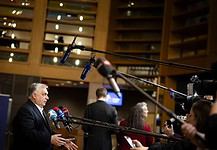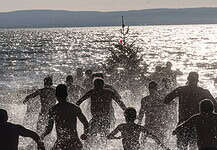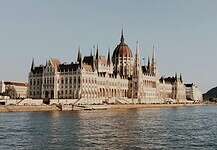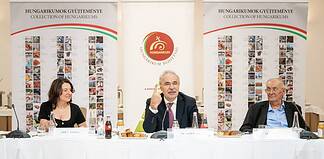Gábor Benedek, Olympic and world champion in modern pentathlon, has become the oldest living Olympic champion in the world at the age of 98. He takes over this position following the death of the previous oldest living Olympic champion, Armenian footballer Nikita Simonyan (1956 Olympic champion with the Soviet team), who passed away on Sunday at the age of 99.
Gábor Benedek, who now lives in Germany, learned of his new status from the news agency in a phone call that reached him shortly before his afternoon rest. “I am not the oldest, that is a Russian,” he responded modestly and incredulously to the first congratulations. When he learned of Nikita Simonyan’s passing, he commented on the news with his characteristic sobriety: “These things happen, I will die too someday.”
Despite his advanced age, Benedek is in excellent health and leads an active lifestyle.
“Fortunately, I cannot complain, I am in very good shape for my age,” he explained. The world’s oldest Olympic champion is cared for by his son, who is currently staying in Budapest, and his grandchildren.
He also keeps up his athletic routine. While Benedek was still jogging four years ago, he now focuses on long walks. His daily routine includes a two-hour walk in the morning and another hour-and-a-half tour in the late afternoon.
The Hungarian-German dual citizen is not planning his annual trip to his vacation home in Pilismarót until the summer, as he has become more sensitive to the cold and therefore avoids traveling in winter.
Fact
Gábor Benedek was born on March 23, 1927, in Tiszafüred into a family of soldiers, which shaped his life early on. He and his older brother Ferenc attended the military high school in Sopron as cadets. During World War II, they were sent to the front, then were taken as prisoners of war in Denmark.
He later worked in Copenhagen, then tried to obtain asylum in Sweden, but was deported back to Denmark. He returned home two years after the war.
It was his military education that brought Benedek into contact with modern pentathlon. After the war, he fenced for Csepeli MTK in the Hungarian capital and competed in the pentathlon for Budapest Honvéd. Between 1948 and 1957, he was a member of the national team and celebrated his greatest successes at the 1952 Olympic Games in Helsinki, where he won the gold medal in team and the silver medal in the individual competition. A year later, Benedek won Hungary’s first world championship title in modern pentathlon.
The political events of 1956 brought his career to an abrupt end. Although he traveled to the Olympic Games in Melbourne as the favorite, the concerning situation in Hungary affected his performance. He finished sixth in the singles and fourth with the team.
However, the 1956 Olympics were not merely memorable for the results. As an organizer of the Olympic team’s revolutionary committee, Benedek played an important role in formulating the recommendation that Hungarian athletes should refrain from shaking hands with the Soviets at the event.
Because of his openly expressed opinions, he was later branded politically unreliable, his awards were revoked, and he was banned from competition. This forced him into unusual career paths. He worked temporarily as a soda water manufacturer and later as a stuntman in the film industry. His financial hardship even drove him to sell his world champion horse named “Higany” (Mercury).
After the end of his active career, Benedek graduated from the University of Physical Education and made a name for himself as a coach. At Budapest Honvéd in the 1960s, he led the training of future greats such as István Móna and Ferenc Török.
However, a personal tragedy prompted him to emigrate in 1969. Due to his daughter’s illness, Benedek traveled with his family to Germany, where he settled in Sankt Augustin near Bonn. There, he founded a center for modern pentathlon with others and retired as a fencing master in the first half of the 1990s.
Since January 2, 2025, following the death of Ágnes Keleti, he has been the oldest living Olympic champion in Hungary, and now in the world.
Despite his long time abroad, Benedek remains connected to his Hungarian sports family. He visits his homeland every year, if possible, and enjoys participating in the events of the Hungarian Olympic Committee and the Hungarian Olympic Champions Club.
Cover Photo: Gábor Benedek in 1952 (Fortepan/Sándor Bojár).








